#Generative AI Certification
Explore tagged Tumblr posts
Text
Generative AI’s Role in IT Service Management: A Game-Changer for Efficiency and Innovation
In the rapidly evolving landscape of IT Service Management (ITSM), emerging technologies continually reshape the way organizations deliver, manage, and optimize IT services. One of the most disruptive innovations today is Generative AI, which is transforming how IT professionals approach their tasks. By harnessing the capabilities of machine learning and artificial intelligence, Generative AI is enhancing service efficiency, improving user experience, and paving the way for more predictive and proactive IT operations.
Generative AI, which refers to AI models capable of producing new content, data, or solutions based on learned patterns from vast datasets, has significant implications for IT Service Management. With the rise of Generative AI certification, professionals can gain the skills needed to harness this transformative technology. It goes beyond traditional automation, enabling ITSM teams to move from reactive problem-solving to proactive service enhancement. This technology offers more than just automated responses; it introduces intelligent, data-driven insights that can optimize IT service delivery and innovation.

1. Enhancing Service Desk Operations
One of the most prominent roles of Generative AI in ITSM is its impact on service desk operations. The service desk is the frontline of IT support, managing a multitude of tickets, incidents, and requests daily. Traditionally, managing these operations required significant human effort, with support teams spending time on repetitive, low-value tasks such as ticket classification, incident management, and basic troubleshooting.
Generative AI, particularly through AI-powered chatbots and virtual agents, is revolutionizing these operations. These intelligent tools can process vast amounts of data from historical tickets and documentation, enabling them to resolve common issues, provide step-by-step guidance, and offer tailored responses to users. For example, instead of waiting for human intervention, a virtual agent can quickly resolve a password reset request or troubleshoot a network connectivity issue. By automating these tasks, IT service teams can focus on more complex issues, ultimately improving productivity and reducing response times. Enrolling in a Generative AI Course can provide deeper insights into how these technologies work and how to leverage them for improved IT service management.
Moreover, generative AI models can continuously learn from interactions, becoming more effective and accurate over time. As a result, the service desk can provide more consistent, 24/7 support to users, ensuring that even complex queries are addressed swiftly without the need for manual escalation.
2. Improving Incident Management and Resolution
Incident management is one of the core processes of ITSM, requiring prompt and efficient handling of issues to minimize downtime and service disruption. Generative AI is playing a crucial role in optimizing this process by providing predictive insights and automating parts of incident resolution.
AI models can analyze past incidents, detect patterns, and predict potential future issues before they escalate into major problems. This predictive capability allows IT teams to proactively address vulnerabilities and risks in the IT infrastructure, thus preventing costly downtime. Additionally, when incidents do occur, Generative AI can quickly suggest solutions or provide troubleshooting guides to service desk staff based on historical data and contextual analysis.
Generative AI also enhances collaboration by providing real-time insights and recommendations to various teams across the organization. For example, if an incident is reported, AI can instantly identify similar cases, suggest resolutions, or alert relevant teams about recurring patterns, significantly speeding up the resolution process.
3. Streamlining Change and Release Management
Change management in ITSM involves controlling and overseeing modifications to IT systems, services, or applications. It’s a delicate balance between innovation and maintaining system stability. Generative AI can assist by providing detailed risk assessments, forecasting potential impacts of proposed changes, and recommending the best timing or methods for implementation.
By analyzing past changes and their outcomes, AI models can identify the most effective strategies for rolling out new services or updates. This capability is particularly useful for release management, where AI can simulate the impact of changes across different environments before they are implemented in production. Generative AI models can also automate routine aspects of the release process, such as code testing or deployment verification, ensuring faster and more reliable updates.
4. Optimizing Knowledge Management
Effective knowledge management is vital for ITSM teams to resolve incidents swiftly and maintain high service levels. Generative AI plays a transformative role by not only indexing and searching knowledge repositories but also creating new knowledge artifacts based on the data it processes.
For instance, AI can analyze IT service logs, historical ticket data, and other internal documents to automatically generate new troubleshooting guides or best practices. This ensures that the knowledge base remains up to date, reducing the time IT professionals spend searching for solutions. Furthermore, AI-driven knowledge management can enhance training and onboarding by providing real-time, contextual learning experiences for new employees, helping them adapt to complex IT environments more quickly.
5. Facilitating IT Asset and Configuration Management
IT asset management and configuration management are critical for ensuring that IT services are delivered efficiently and securely. Generative AI can support these processes by automating the tracking and auditing of IT assets, enabling real-time updates to configuration management databases (CMDBs), and generating recommendations for optimizing resource utilization.
AI models can also provide insights into the lifecycle of IT assets, predicting when equipment or software may need maintenance or replacement. This proactive approach reduces the likelihood of service disruptions due to outdated or malfunctioning assets, ensuring smoother and more reliable service delivery.
6. Driving Continuous Service Improvement
Continuous service improvement (CSI) is a key principle in ITSM, focusing on the ongoing enhancement of IT services. Generative AI plays a vital role in this area by offering real-time analytics and insights that inform decision-making.
With access to vast amounts of data, Generative AI can identify trends, predict future service demands, and recommend ways to optimize performance. For example, it can analyze service response times, user feedback, and system performance metrics to highlight areas for improvement. This data-driven approach helps IT teams make informed decisions and implement strategies that align with business goals and user expectations.
Conclusion: The Future of IT Service Management with Generative AI
Generative AI is not just another tool in the ITSM toolkit; it represents a paradigm shift in how IT services are delivered and managed. By automating routine tasks, providing predictive insights, and enabling more proactive service management, Generative AI empowers IT teams to focus on innovation and continuous improvement. As AI technology continues to evolve, its role in ITSM will only grow, offering new opportunities for enhancing efficiency, reducing operational costs, and delivering superior user experiences.
Incorporating Generative AI into ITSM strategies is no longer optional but essential for organizations aiming to stay competitive in the digital age. As this technology becomes more integrated into IT operations, businesses will experience a new era of service management, characterized by increased automation, smarter decision-making, and a relentless focus on innovation.
#Generative AI Certification#Generative AI Course#Generative AI Training#Artificial Intelligence#Generative AI Technology#Generative AI Benefits#Generative AI in ITSM#Generative AI Importance
2 notes
·
View notes
Text
What are the Generative AI Certifications in 2025
Generative AI certifications in 2025 are essential for individuals aiming to excel in this transformative field. These certifications provide in-depth knowledge of generative AI principles, techniques, and applications, preparing professionals for a competitive job market.
This content explores the best generative AI certifications available, their benefits, and how to choose the right one for your career goals.
The rise of generative AI represents a groundbreaking evolution in artificial intelligence. Industries across the globe are leveraging this technology to innovate and create. If you aim to capitalize on this opportunity, obtaining the best generative AI certifications is a step toward mastering AI tools and standing out in the competitive marketplace.

0 notes
Text
The GSDC Generative AI Certification offers an invaluable opportunity to demonstrate expertise in the cutting-edge field of generative AI.
Artificial Intelligence has become increasingly prevalent, this certification holds immense significance.
By focusing on the practical application of generative AI, this certification equips individuals with the necessary skills to navigate the complexities of AI-driven technologies.
GSDC's commitment to providing certification exams ensures that professionals can showcase their proficiency in generative AI, emphasizing its relevance and value in contemporary society.
#generative ai certification#generative ai#generative ai professional certification#open ai certification#open ai#creative ai
0 notes
Text
How Can Generative AI Certification Transform Your Career?
Unlock the Future of Your Career with Generative AI Certification! This concise guide explores the incredible impact of becoming certified in generative AI, the forefront of tech innovation. Discover how mastering the art of AI-driven content creation can propel you into high-demand roles across tech, design, and beyond. Elevate your problem-solving skills, creativity, and market value in an instant. Ready to lead, innovate, and transform your professional journey? Generative AI certification is your key to unlocking a world of opportunities. Dive in to future-proof your career and stand out in the digital age!
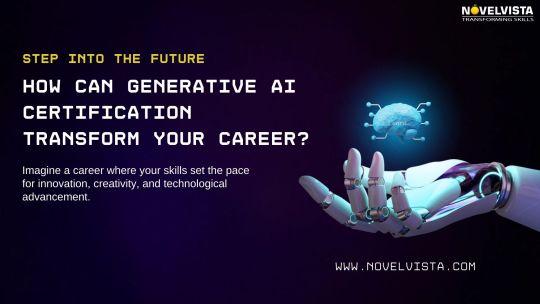
0 notes
Text
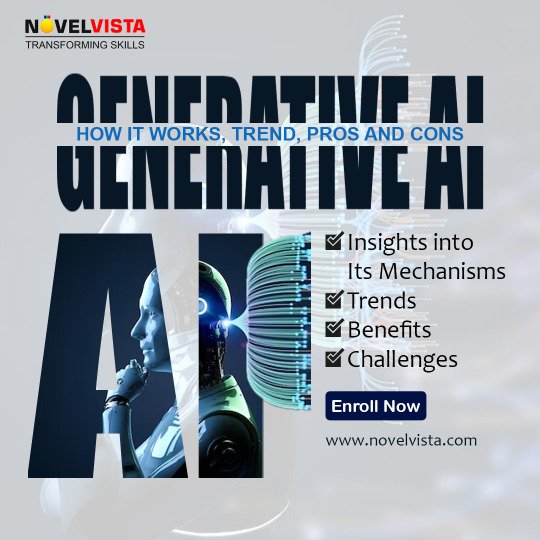
Generative AI, which includes technologies like machine learning algorithms and neural networks, works by analyzing and learning from data to generate new, original content. This field has seen a growing trend in offering certifications to equip professionals with the necessary skills and knowledge.
Pros:
Innovation: Facilitates creative content generation in various domains.
Efficiency: Streamlines tasks in design and development.
Personalization: Enhances user experiences in technology and media.
Cons:
Ethical Concerns: Raises issues around originality and intellectual property.
Misuse Potential: Can be used to create misleading or harmful content (e.g., deepfakes).
Job Impact: Might displace traditional roles in content creation industries.
0 notes
Text
NeuAI Labs: Leading AI ML Certification Programs
Earn globally recognized AI ML certifications at NeuAI Labs. Upskill and stay ahead in the dynamic field of artificial intelligence and machine learning.
#artificial intelligence course#artificial intelligence in daily life#artificial intelligence internship#artificial intelligence training#ai course#ai certification#generative ai certification#machine learning internship#machine learning course#neuailabs#futureofai
1 note
·
View note
Text
Sweet Dreams Ai Genarated
#disney#ai certification#ai generated#ai powered authoring tool#amazing#video#weird#strange#my video#omg#creepy#scary
27 notes
·
View notes
Text
Elevate Your Website’s Security with WordPress Security Services
Your WordPress website is a valuable asset that deserves top-tier protection. At Atcuality, we provide comprehensive WordPress security services to safeguard your site from cyberattacks and data breaches. Our team starts with an in-depth analysis of your website’s security framework, identifying and addressing vulnerabilities. We implement state-of-the-art measures such as malware scanning, brute force protection, and database encryption to enhance your site’s security posture. Additionally, we offer ongoing maintenance and support to ensure your site remains secure over time. With Atcuality, your website is not only protected but optimized for performance. Trust us to keep your digital assets safe and help you maintain a competitive edge in the online world.
#wordpress#website#web development#web design#web developing company#website development#web developers#ai generated#artificial intelligence#ai applications#iot#iot applications#iot development services#iotsolutions#iot platform#digitaltransformation#technologynews#techinnovation#augmented reality#augmented human c4 621#augmented and virtual reality market#augmented intelligence#metaverse#virtual reality#ar vr technology#amazon services#cloud server hosting#ssl#sslcertificate#ssl certificates
2 notes
·
View notes
Text



what the actual fuck is facebook AI the whole last image is an EVENT that it decided to make off of one of my posts in a group??
#what the fuck bro#fathers death certificate reveal!!#W H A T#pulling my damn leg#and beating me with it#facebook#ai#ai generated#ai is stupid#ai is bad#ai is a plague#ai is bullshit#ai is shit#what the hell#what the fuuuuck#cheese rambles
3 notes
·
View notes
Text
Building Trust In AI – Unlocking Transparency and Employee Advocacy
#certification#online courses#technology#tech#education#artificial intelligence#techinnovation#technoblade#ai generated#digitalart
2 notes
·
View notes
Text

Look what we found: a Hug Certificate container!! How cool is that?!?! 🙂
#photo#photography#yyj#victoria#bc#Saanich#Starbucks#random acts of kindness#kindness#hugs#Hug Certificates#not ai generated
2 notes
·
View notes
Text
How Can You Transform Your Project Management with Generative AI? Integration Guide
In today’s fast-paced business environment, project management is evolving rapidly, driven by technological advancements. Among these advancements, generative AI is emerging as a game changer, capable of enhancing efficiency, improving decision-making, and fostering creativity within project teams. If you’re looking to integrate generative AI into your project management processes, obtaining a Generative AI Certification will provide you with the essential skills and knowledge. This step-by-step roadmap will guide you through the integration journey.

Step 1: Understand Generative AI
Before diving into integration, it’s essential to understand what generative AI is and how it can benefit project management. Generative AI refers to algorithms that can generate new content or data based on existing information. This can include generating reports, predicting project outcomes, creating resource allocation strategies, and more. Familiarize yourself with various generative AI tools available in the market, such as Open AI’s Chat GPT, Google’s Bard, and other specialized platforms designed for project management.
Step 2: Identify Pain Points in Your Current Processes
The next step is to identify specific challenges or pain points in your current project management processes that generative AI could address. Common issues may include:
Inefficient resource allocation
Poor communication among team members
Difficulty in project forecasting and risk management
Time-consuming reporting and documentation
Conduct a thorough analysis of your current processes and gather feedback from team members to pinpoint where generative AI can add the most value.
Step 3: Define Objectives and Use Cases
Once you have identified the pain points, it’s time to define clear objectives for integrating generative AI. What do you hope to achieve? Some possible objectives include:
Automating routine tasks
Enhancing communication with stakeholders
Improving accuracy in project forecasting
Increasing overall project efficiency
Based on these objectives, outline specific use cases for generative AI in your project management workflow. For example, you might decide to use AI for:
Generating project status reports
Creating project schedules based on historical data
Predicting potential risks and recommending mitigation strategies
Step 4: Select the Right Tools and Platforms
With your objectives and use cases defined, the next step is to select the right generative AI tools and platforms. Consider factors such as:
Ease of integration: Choose tools that seamlessly integrate with your existing project management software (e.g., Microsoft Project, Asana, Trello).
Scalability: Ensure the tool can grow with your organization’s needs.
User-friendliness: Look for platforms that offer intuitive interfaces and support to minimize the learning curve for your team.
It may also be beneficial to explore vendor partnerships or consult with experts who specialize in AI implementations in project management.
Step 5: Develop a Pilot Project
Before fully rolling out generative AI across your organization, start with a pilot project to test its effectiveness. Select a manageable project where you can implement the generative AI tools and processes. Monitor the results closely, collecting data on efficiency improvements, time savings, and user feedback.
During this phase, encourage team members to share their experiences and suggest adjustments to optimize the AI’s performance. This iterative approach allows for fine-tuning before a broader implementation.
Step 6: Train Your Team
Integrating generative AI into your project management processes requires a cultural shift and training for your team. Conduct workshops and training sessions, including a Generative AI Course, to educate team members about the benefits of generative AI and how to effectively use the selected tools. Consider creating a dedicated AI task force or appointing “AI champions” within teams who can lead training and support their peers as they adjust to the new technology. Emphasizing the collaborative nature of generative AI can help alleviate any concerns about job displacement, positioning AI as a tool that enhances human capabilities.
Step 7: Monitor Performance and Iterate
Once generative AI is fully integrated, continuously monitor its performance and gather feedback from users. Track key performance indicators (KPIs) such as project completion times, resource utilization rates, and overall team satisfaction.
Use this data to make informed decisions about further adjustments or expansions of your AI capabilities. Remember, the integration of generative AI is not a one-time effort; it requires ongoing refinement and adaptation to align with changing project needs and organizational goals.
Step 8: Foster a Culture of Innovation
Finally, foster a culture of innovation within your organization. Encourage teams to explore new use cases for generative AI, share their successes, and experiment with different approaches. By promoting an innovative mindset, you can unlock the full potential of generative AI, driving continuous improvement in your project management processes.
Conclusion
Integrating generative AI into project management processes offers an exciting opportunity to enhance efficiency, improve decision-making, and foster creativity among teams. By following this step-by-step integration roadmap, organizations can navigate the complexities of AI implementation, ultimately leading to more successful project outcomes and a competitive edge in the market. Embrace the future of project management and leverage the power of generative AI to drive your projects toward success.
#Generative AI Certification#Generative AI Course#Generative AI Training#Generative AI Technology#Artificial Intelligence#Generative AI Project Management#Generative AI Benefits
0 notes
Text
How Certification in Generative AI Can Revolutionize Project Management Practices
In today’s fast-paced business world, staying ahead requires adapting to change and mastering the tools that drive it.
A Certification in Generative AI in Project Management is emerging as a game-changer for professionals seeking to transform their project management practices. By harnessing the power of artificial intelligence, project managers can streamline workflows, enhance decision-making, and achieve unparalleled efficiency.
Why Generative AI is Essential for Project Management Automating repetitious tasks is only one aspect of generative AI, a subset of artificial intelligence. It actively supports the development of innovative solutions, schedule optimization, and accurate project outcome prediction. This translates into improved resource allocation, less delays, and more intelligent risk management for project managers.
By giving professionals the ability to use AI technologies, a Generative AI in Project Management Certification ensures that their projects are not only managed but also strategically led to success.
2 notes
·
View notes
Text
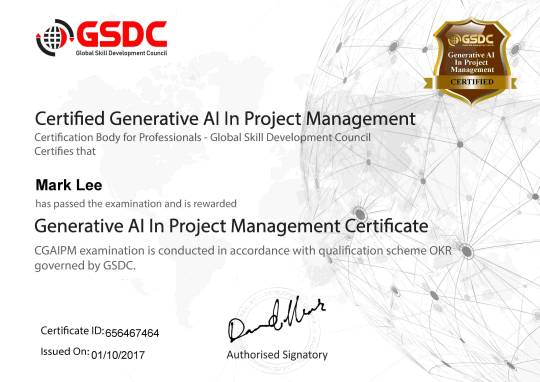
A Generative AI in Project Management Certification program equips professionals with the knowledge and skills needed to leverage cutting-edge artificial intelligence techniques for project planning, execution, and optimization. This certification delves into the application of generative AI models and algorithms to streamline project workflows, enhance decision-making processes, and improve project outcomes. Participants will learn how to harness AI-driven predictive analytics, automate project-related tasks, and uncover insights from vast datasets. By completing this certification, individuals can become proficient in utilizing generative AI tools and methodologies to effectively manage complex projects, mitigate risks, and drive project success. This certification is ideal for project managers, team leaders, and professionals seeking to stay at the forefront of project management innovation in an increasingly data-driven world.
#certified generative ai in project management#generative ai in project management certification#generative ai certification#generative ai#generative ai professional certification#open ai certification#open ai#creative ai
1 note
·
View note
Text
Generative AI: How it works, trend, pros and cons
Generative AI, which includes technologies like machine learning algorithms and neural networks, works by analyzing and learning from data to generate new, original content. This field has seen a growing trend in offering certifications to equip professionals with the necessary skills and knowledge.
Pros:
Innovation: Facilitates creative content generation in various domains.
Efficiency: Streamlines tasks in design and development.
Personalization: Enhances user experiences in technology and media.
Cons:
Ethical Concerns: Raises issues around originality and intellectual property.
Misuse Potential: Can be used to create misleading or harmful content (e.g., deepfakes).
Job Impact: Might displace traditional roles in content creation industries.
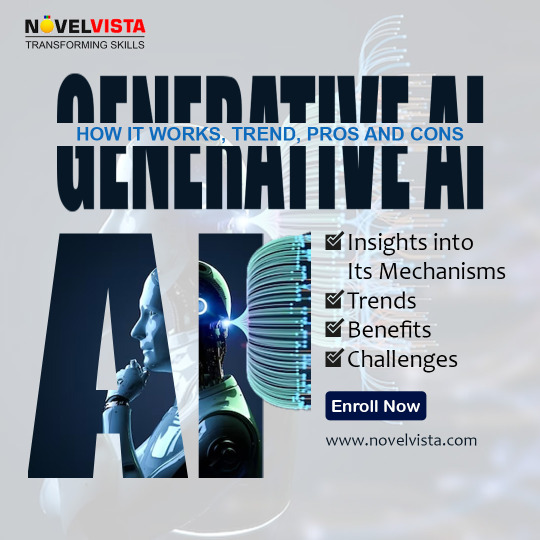
0 notes
Text
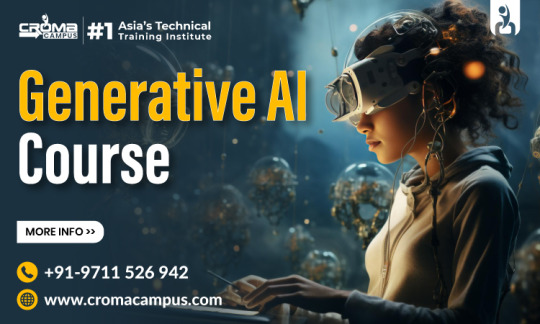
Master the cutting-edge field of Generative AI with the Generative AI Online Course. Among the topics covered in this course are deep learning, neural networks, transformers, and advanced AI models, including ChatGPT, DALL·E, and BERT. Gain hands-on experience in AI model development, prompt engineering, and fine-tuning techniques.
0 notes